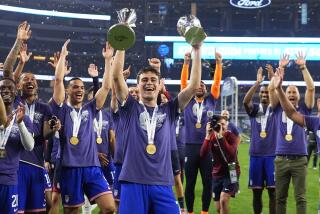Column: Germany remains important partner for U.S. soccer
Timothy Chandler’s last two appearances for the U.S. national team came more than two years ago, in back-to-back losses to Mexico and Costa Rica that crippled the Americans’ hopes of qualifying for the 2018 World Cup.
It’s probably not insignificant that those games were also the last for coach Jurgen Klinsmann, who made German-Americans Chandler and Jermaine Jones regulars with the national team and gave Julian Green, John Brooks and Fabian Johnson their first starts.
Jones is now retired, Johnson has played just one full game for the U.S. since 2016, and only Green made more than three appearances for the national team last year. That’s a transition that seems likely to continue under Gregg Berhalter, who opened his first training camp as the U.S. coach last week.
“Jurgen invited a lot of German players,” Chandler said. “I think he liked the players because [they] played in big leagues in Europe. Gregg is now new. I don’t know what will happen in the future with him.”
Even if the role of dual nationals continues to decline, the decades-old relationship between German and U.S. soccer will continue to grow — to the benefit of both sides.
In the last 12 months, a dozen top American teenagers have jumped to teams in Germany, among them national team players Tyler Adams and Josh Sargent as well as former Galaxy II midfielder Alex Mendez, the Golden Ball winner in last year’s CONCACAF U-20 tournament.
Three other U.S.-born national team players — forward Bobby Wood and midfielders Christian Pulisic and Weston McKennie — have been there since at least 2017. Add in Hertha Berlin goalkeeper Jonathan Klinsmann, the former coach’s son who got a brief national team call-up last November, and you could put together an entire starting lineup of U.S. players on Bundesliga rosters.
Only three of the 11 are older than 25.
“It’s one of the best leagues in Europe and a very, very good league for young players,” said Chandler, who said he has actively recruited young Americans to play in Germany.
“We talk a lot with players about the Bundesliga,” he said. “I hope the young guys would see it and say ‘Hey, we want to play in Germany.’ For the kids, it’s a good opportunity.”
Opportunity isn’t the only draw. The traditional playing cultures of the two countries, which put a premium on strong, athletic players, has led German clubs to recruit more heavily in the U.S. than do clubs from Spain or England. Add in Germany’s deep, well-organized developmental system, which stresses discipline as well as tactical acumen, and the success of those who have gone there — including Pulisic, Wood and, before them, Steve Cherundolo and Eric Wynalda — and it’s obvious why Germany has become an increasingly attractive destination for young Americans.
“It’s not so difficult for Americans to come to Germany,” former German national team star Lothar Matthaus, who finished his career in MLS, told Bleacher Report. “It’s much more difficult when they have to play in Spain, for example, or in Italy — different soccer and a different mentality.
“Because we are very close to each other, it makes sense for American players to come to Germany to make their first step in a strong soccer competition.”
It’s also far easier to get a work permit to play in Germany than in the United Kingdom. Plus Bundesliga starting lineups are, on average, the youngest of any of Europe’s top five leagues.
“The Bundesliga traditionally takes the risk to throw young players into the cold water if they impress over time in training and their second teams,” Jurgen Klinsmann said.
Cherundolo, a two-time U.S. World Cup player who spent his 15-year club career with Hannover, agreed.
“Younger players get opportunities. And not just 20 minutes here, 15 minutes there,” he told Bleacher Report. “They get real opportunities to start games.”
That paid dividends under Klinsmann, with three of the five goals in his only World Cup as U.S. coach coming from dual nationals who got their start in Germany.
There were also drawbacks. The dressing room often separated along English- and German-speaking lines. U.S.-born players such as Tim Howard openly questioned their teammates’ commitment to the crest.
Klinsmann, who widened the opportunities for U.S. players in Germany, insists there were more positives than negatives and says the inclusion of foreign-born players actually made the team more American.
“The best players need to play for the national team, regardless if they were born in the U.S. or outside,” he said. “The beauty of a national team is the diversity of the team. which reflects your country. And the United States was, is and always will be a country of immigration.”
That’s an issue Berhalter, who played seven years in Germany, hasn’t had to tackle yet since his first camp roster is made up entirely of MLS players. However, he will be able to call up players from Europe, including dual nationals, for friendlies with Ecuador and Chile in March and again for the Gold Cup this summer.
“I wouldn’t even classify them as German. Just call them players,” he said. “Any U.S.-eligible players we’re considering.”
But, he added, “we want guys that are committed to the team culture.” That could work against Chandler, who is in Florida with Eintracht Frankfurt, his club team, rehabbing a right knee that required surgery last August.
Chandler, 28, was playing well before the injury and, as an outside back, could fill a gaping hole on the national team. He had a chance to do that in a pair of World Cup qualifiers under Bruce Arena, Klinsmann’s replacement, and declined the invitation by text message the day before players were supposed to report.
Now, he’s hoping for another chance.
“When you are fit and you play a good season, you are always angry when you’re not called up for the national team,” said Chandler, who could return to the Frankfurt lineup next month. “But this is the process of football and you have to live with it.”
kevin.baxter@latimes.com | Twitter: @kbaxter11







